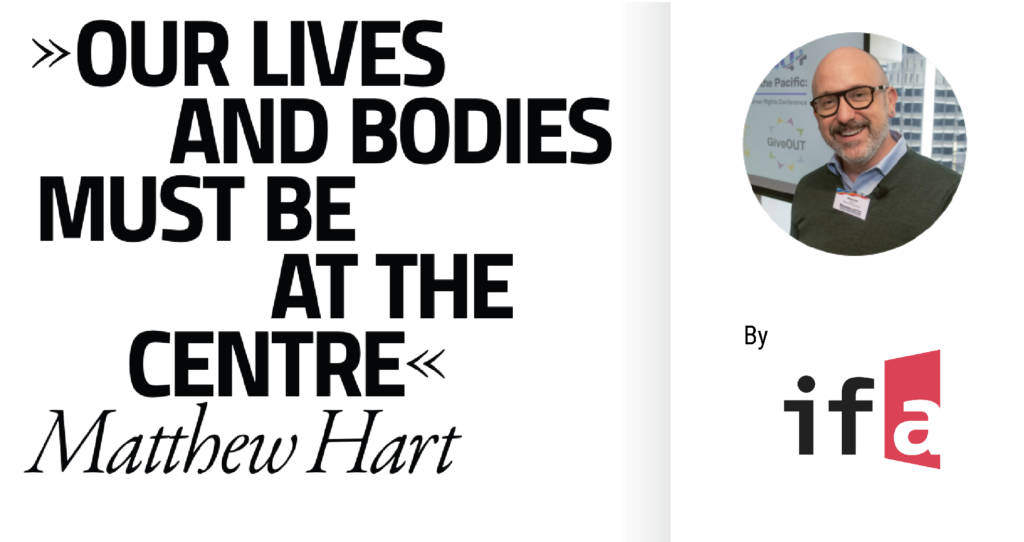“Our Lives and Bodies Must Be at the Centre”: An Interview with Matthew Hart, GPP Executive Director by Ifa

The 2023 publication “Gender and Diversity: Queering the Funds” by Ifa, Institut für Auslandsbeziehungen, features an interview with Matthew Hart, Executive Director of GPP, discussing the power of funding mechanisms, the challenges of finances, and strategies for improving the connection between funders and grant recipients.
The following is an excerpt from the interview:
In your presentation to the 2022 Gender & Diversity Alums Network meeting, you mentioned the small proportion of funding for LGBTQIA+ issues relative to total global giving. Why do you think this number is so small?
There are a few reasons. One is movement maturity. The LGBTQI political movement has had a longer runway as a political project which deferred or rejected institutionalisation. It said, “We want to build a people’s movement, a political project which is intersectional, multi-generational, radical, and which rejects capitalism.” That’s our origin as a movement. We had a longer runway before we hit the stage where we were, like, “Oh my God, I’m doing this all the time. I can’t clean the house, take care of the children and run a set of political projects with my friends. I need to get paid for this.” And that was informed by a broader collaboration with labour, unions and worker’s rights. That’s one piece.
The second thing is that institutional philanthropy was—historically and in the most profoundly well-documented manner—structurally homophobic. They did not want to fund LGBTQI people, [or even] women’s rights organisations, which were also in their infancy 25 to 35 years ago—let alone [were they willing to] understand the complexities of gender variance, trans people and the whole spectrum of what exists within those communities. They couldn’t possibly have had the competency to address our communities.
The third piece, namely queer people with the inherited wealth and political competency to ascend in traditional philanthropy, came late. That was in the 1980s, and it was accelerated by the HIV crisis. That accelerated an agenda which set out our social, political, sexual, and physical rights.
We’re still in the phase of organising our money. We are a small percentage of all development and philanthropic resources. But I think we’re at the moment when the acceleration occurs. All the work which the Global Philanthropy Project (GPP) does, everything which we do in our external programming, is meant to fuel that acceleration to capture those resources institutionally, so that the field has access to them.
You also mentioned that the GPP wants to make sure groups within the queer community have their own organisations: that trans people don’t need to always go through cis organisations to receive funding, for example. Historically, much of the money in the LGBTQIA+ community has been concentrated with cis gay men. What is the cis gay community doing well to make sure that more marginalised queer people get a seat at the table, and what could it do better?
I have one caveat, which is that who holds power and money in each region and country is much more complicated than cis gay men. With our Global Resources Report, we hope to equip our movements with the ability to have more nuanced discussions about where power and money sits. It’s easy to have a set of accusations and assumptions about actors like cis gay men. And that’s historically true. But those realities are changing with the success of political movements, and it’s important for us to keep our targets real, and also not artificially create horizontal hostilities, but actually understand the political ecosystem where our common advancement can be had.
If you understand who has the money and where it’s going, it’s easier to have a political discussion with those power holders. If you go to a group of cis gay men because they’re assumed to have the money and the power, but they have no money, you’re missing the boat. The power is somewhere else. We want to reduce those distances.
I would venture that funding inequities are mostly unintentional; they are mostly episodic. It’s about the activists who have asked for the money; it’s about the context; it’s about the funders’ priorities; it’s a million things. Our job at GPP is to make visible those inequities within the funding ecosystem.
Another idea which came up in your presentation is that LGBTQIA+ communities are barometers for the openness and democratic health of societies. Would you say that’s a relatively new phenomenon?
It’s relatively new for non-queer groups. Queer people have always known it. Our offices got firebombed, our murders did not get investigated, our disappearances were invisible, our termination of employment was not disputed, being kicked out of our housing was not able to be reported. We have experienced that for our entire history.
I do think the GPP community, and many activists, have helped centre the idea that state-sponsored homophobia is a core component of closing space. It’s an early indicator of authoritarianism. We see that in very real examples: in Bulgaria and Belarus, in Poland, in Hungary, in the United States, in Kenya, in the Philippines.
Now we have a documentary infrastructure which is able to tell those stories across geographies. We’re prioritising a consolidation of those stories, to be able to make the case more broadly: attacks on LGBTQI people are anti-democratic. But that’s an ongoing case-making project. We haven’t won that case. The »traditional family rights« agenda is equipped and financed in ways we can’t match. There’s an enormous amount of money moving around right now, supporting anti-democratic work, weaponising gender against democracy, and using queer bodies and our sex and our lives as fodder for a new kind of 21st century culture war. We’re in the fight. This is going to be the rest of our political lives, and there’s no guarantee who will win.
